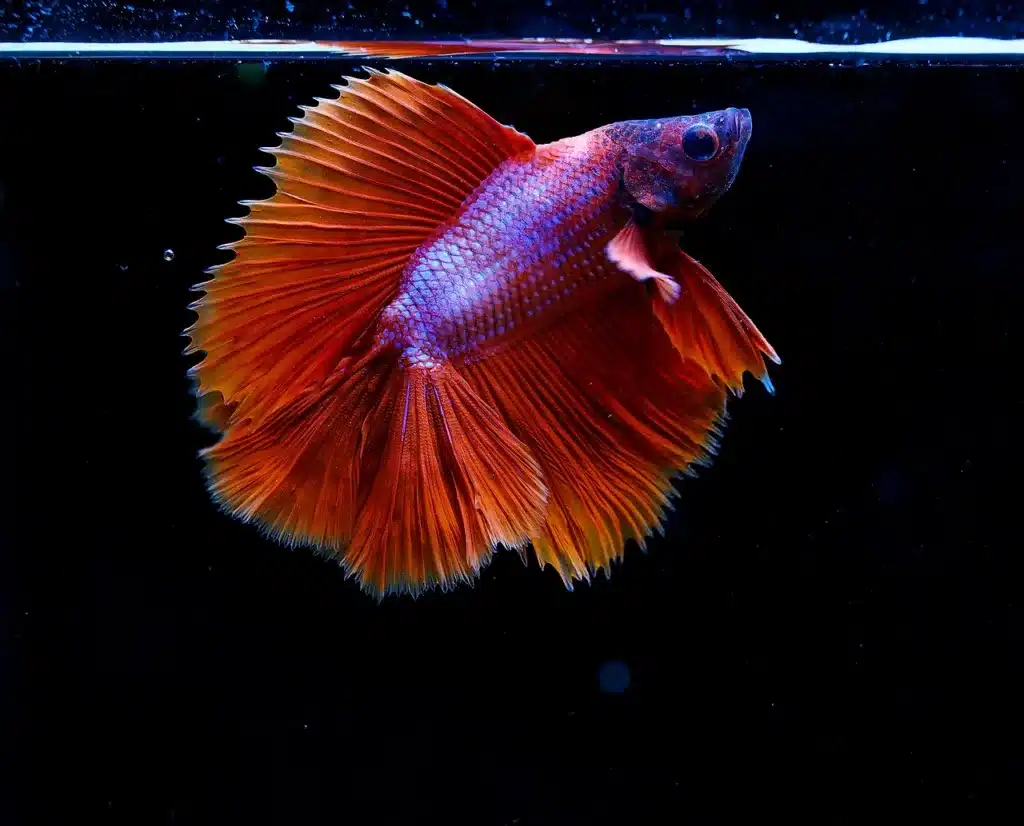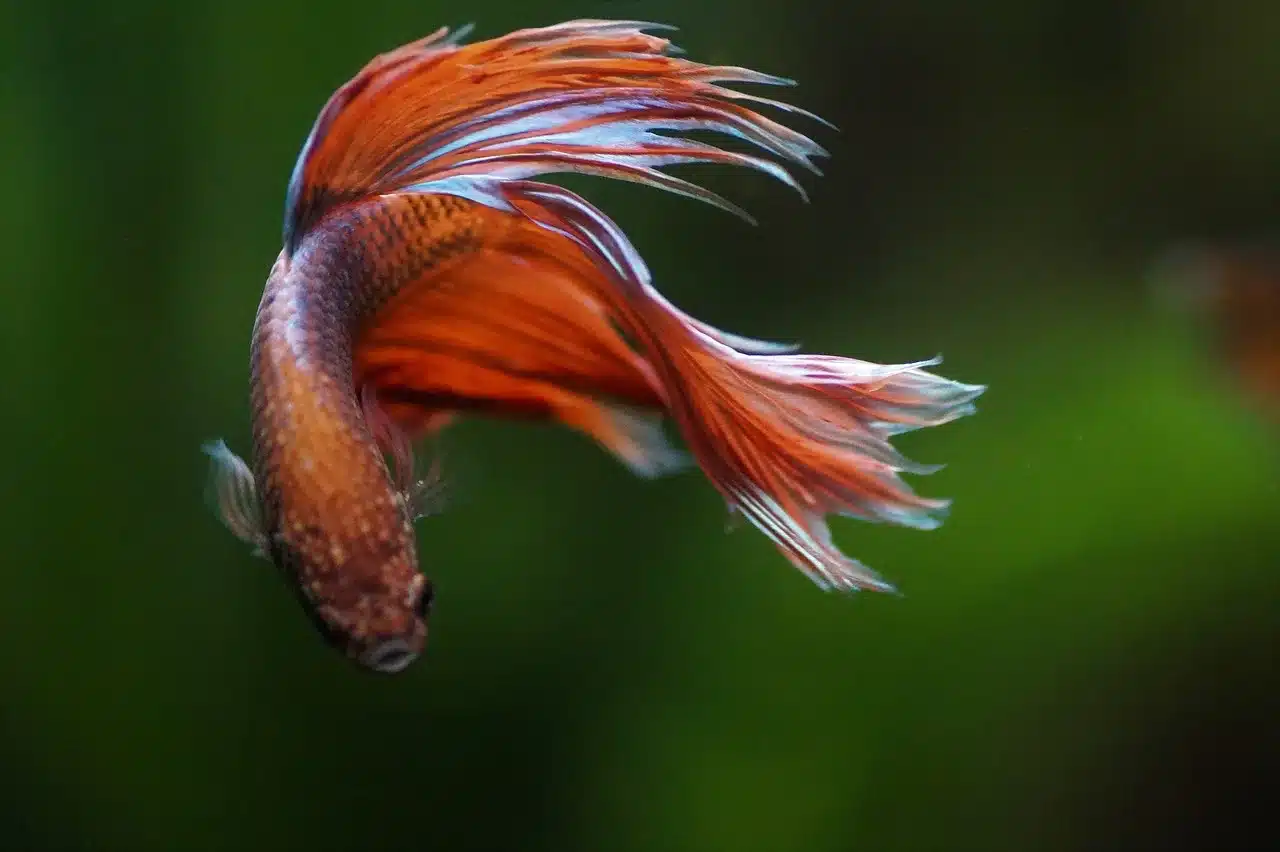So, you’ve got a betta fish, or maybe you’re considering getting one?
Either way, you’re probably wondering how tough these little guys are when skipping meals. Well, you’re in the right place to find out how long can a betta fish survive without food and what exactly happens if they go too long between feedings.
We’ll also cover how to spot the signs that your fish might be feeling the pinch of a missed meal. Stick around to get all the insights and tips to keep your friend happy and healthy, even when life gets busy!
How Long Can a Betta Fish Survive Without Food?
Betta fish are remarkably resilient and can technically survive up to two weeks without food. However, it’s crucial to understand that this endurance doesn’t equate to optimal health. Prolonged gaps between meals can lead to significant stress and health issues. It’s a reminder of the importance of maintaining a regular feeding schedule to ensure their well-being.
Why They Can Last That Long
Bettas are adapted to endure irregular feeding schedules in their natural habitats, where food might not always be available. They have a slower metabolism, which allows them to manage their energy reserves efficiently during food-scarce situations.
While adult bettas can manage for a week without any adverse effects, it’s not ideal to test their limits. The younger the fish, the less resilient they are, so baby bettas need to eat more frequently than adults to support their growth and development.
Consider Their Environment
The conditions of your betta’s tank also play a massive role in handling periods without food. A well-maintained tank with stable temperatures and clean water helps reduce stress and keeps your betta in better shape during these times.
In summary, while your betta might not need to eat every day, consistent, regular feeding is vital to a healthy and happy fish. Feed your betta fish regularly and ensure their tank conditions are ideal to keep them healthy and happy.

What Happens if Betta Fish Doesn’t Eat for a Long Time?
Going without food isn’t just a minor inconvenience for your betta—it can lead to several serious issues that could compromise their health and even shorten their lifespan. Here’s what happens when your betta fish misses out on their meals for an extended period:
- Energy Depletion
Initially, bettas use their stored energy reserves to keep functioning. However, as these reserves deplete, the fish become noticeably less active and more lethargic. They might not swim around as much and could just stay at the bottom of the tank or linger near the surface.
- Muscle Wasting
Over time, the lack of food leads to muscle wasting. Your betta might start to look thinner and weaker. This muscle loss can affect their swimming capability and overall agility, making navigating their environment harder.
- Immune System Suppression
Good nutrition is essential for keeping the immune system strong. Without it, bettas become more susceptible to diseases. Their bodies aren’t as capable of fighting off infections, which can lead to sickness more frequently.
- Stress and Behavioral Changes
Hunger can cause significant stress for any living creature, including betta fish. This stress can result in behavioral changes such as increased aggression or withdrawal. Stress is particularly detrimental because it can exacerbate other health issues and lead to a decline in overall condition.
- Potential for Long-Term Damage
Extended periods without adequate nutrition can cause irreversible damage to the betta’s organs. The longer the betta goes without food, the more severe the impact on its overall health and vitality.
What Are the Signs That Betta Fish is Suffering From Not Eating?
Recognizing the early warning signs of starvation can help you take swift action to address any feeding issues before they become severe. Here are the key indicators that your betta might be having a tough time due to a lack of food:
- Lethargy
One of the first signs is a general lack of activity. Betta fish are usually quite lively and have a strong presence in their tank. Suppose your betta seems unusually inactive, staying at the bottom or persistently hiding behind plants and decorations. In that case, it might be a sign they’re not getting enough food.
- Physical Appearance Changes
Watch for changes in your betta’s physical appearance:
- Sunken Belly: The belly area may appear concave or sunken if your betta has missed too many meals.
- Fading Colors: Bettas are famous for their bright colors, but these can fade if they’re not getting the proper nutrients.
- Clamped Fins: This is when the betta keeps its fins close to the body rather than splayed out beautifully; it’s a sign of stress and poor health.
- Decreased Interest in Food
It might sound counterintuitive, but a betta fish suffering from not eating might show less interest in food. If your betta ignores their meals when you feed them, it could be due to stress or illness from a previous lack of food.
- Surface Gasping
It could signify distress if your betta frequently comes to the surface to gulp air. While bettas are labyrinth fish and naturally breathe air, excessive surface gasping could indicate something is wrong, especially with other signs.
- Weakness and Difficulty Swimming
When bettas have not eaten adequately, they may display weakness and have trouble maintaining buoyancy or swimming normally. This can include struggling to stay upright, sinking to the bottom, or being unable to swim against the tank’s current.
Conclusion
Taking care of a betta fish involves more than just admiring their beauty—it requires attention to their dietary needs to ensure they stays healthy and vibrant. Remember, while bettas can technically survive for some time without food, regular feeding is crucial for their well-being. Knowing how long can a betta fish survive without food, understanding the risks of prolonged fasting, and recognizing the signs of nutritional deficiency are all essential for responsible betta fish care.
You can ensure your colorful companion thrives in your care by closely monitoring your betta’s behavior and appearance and maintaining a consistent feeding schedule. If you ever notice any signs of distress or ill health, act promptly to adjust your environment or seek advice from a vet. After all, a happy betta is a healthy betta.
